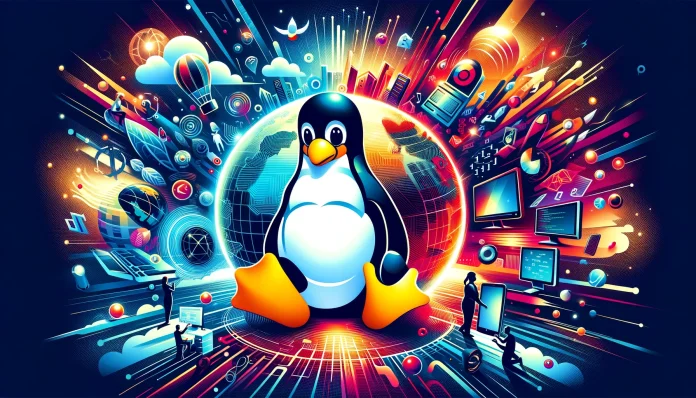Linux is a powerful, open-source operating system that underpins much of the digital world today. It was created by Linus Torvalds in 1991 as a free alternative to the UNIX operating systems, with the aim of providing a system that anyone could use and modify. Over the years, Linux has grown from a simple kernel into a full-fledged operating system used in servers, desktops, smartphones, and embedded systems around the globe.
The creator of Linux is also the creator of GIT.
Linus Torvalds, a Finnish software engineer, created Linux in 1991 as a free and open-source alternative to the proprietary UNIX operating systems. His motivation for creating Linux was primarily personal interest and dissatisfaction with existing systems like MS-DOS and MINIX. In 2005, Torvalds also created GIT, a distributed version control system that has become the standard for managing software projects, especially in the open-source community. GIT was developed out of necessity for a more efficient and reliable system to manage the development of the Linux kernel.
Linus wrote Linux while he was a university student in his early years.
Linus was a student at the University of Helsinki when he began working on Linux. His initial work was a simple terminal emulator to access the university’s UNIX servers, which eventually grew into a full operating system kernel. This project was driven by Linus’s curiosity and his desire for a freely available operating system that he could tweak and improve. The development of Linux was a monumental task that showcased Torvalds’ exceptional programming skills and his dedication to creating an open and accessible system.
Linus created Linux because he disliked MS-DOS and MINIX; he liked UNIX but couldn’t afford it, so he made his own UNIX clone.
Linus’s dissatisfaction with MS-DOS and MINIX, and his inability to afford a UNIX system, led him to create Linux. He sought an operating system that was both powerful and accessible, embodying the principles of open-source software. This motivation underscores the revolutionary impact of Linux, demonstrating how a single individual’s vision can transform technology and lead to the creation of a system that powers much of today’s digital infrastructure.
Linux is named after its founder, Linus Torvalds.
The name “Linux” originates from a combination of Linus’s name and UNIX, the operating system that inspired its creation. Initially, Linus intended to name the project “FreaX” but opted for “Linux” on the suggestion of Ari Lemmke, who hosted the project on his server. This naming not only honors its creator but also reflects its roots in the UNIX tradition.
100% of the top 500 supercomputers in the world run on Linux, 85% of smartphones use an operating system based on Linux, and 90% of cloud infrastructure runs on Linux.
Linux’s architecture offers flexibility, reliability, and performance, making it the preferred choice for powering supercomputers, smartphones, and cloud infrastructure. Its dominance in these areas is a testament to the kernel’s scalability and efficiency. For supercomputers, Linux provides the necessary computational power and flexibility for high-performance tasks. In the smartphone market, Android’s use of the Linux kernel has made it the most widely used operating system globally. Similarly, the cloud computing sector relies on Linux for its stability and scalability in managing large-scale infrastructures.
Android is the most used operating system in the world, and it runs on Linux.
Android, developed by Google, is built on top of the Linux kernel, marrying Linux’s robustness with a user-friendly interface for mobile devices. This combination has led to Android becoming the most popular mobile operating system worldwide, showcasing Linux’s versatility and its ability to run on devices ranging from powerful supercomputers to everyday smartphones.
In 2000, Steve Jobs offered Linus Torvalds a job at APPLE on the condition that he stop developing Linux, but Linus declined to join and continued to develop his product.
Steve Jobs’s offer to Linus Torvalds to work at Apple—with the stipulation that he cease development on Linux—highlights the potential that Jobs saw in Torvalds’ talent. Linus’s decision to decline the offer and continue his work on Linux emphasizes his commitment to the open-source philosophy and the importance he places on the collaborative development of the Linux kernel.
Bill Gates created Windows, but he uses Linux extensively and openly supports Linux.
Bill Gates, despite being the creator of Microsoft Windows, has acknowledged the importance and utility of Linux, especially in server environments and for educational purposes. Gates’s support for Linux underscores the recognition of its reliability and performance, even among competitors. This also reflects the broader tech industry’s acknowledgment that collaboration and open-source projects can drive innovation.
It took 3 years after its announcement for Linux to be released.
The three-year gap between Linux’s announcement and its release was a period of intense development and refinement. Linus and a growing community of programmers worldwide worked to expand Linux from a simple kernel to a fully functional operating system. This period highlights the collaborative effort that has been a hallmark of Linux’s development process.
The original name of Linux was “FreaX”, a combination of “free”, “freak”, and “Unix”.
The initial name “FreaX” represented Linus’s vision for a free, open, and somewhat unconventional system. The evolution of the name to Linux symbolizes the project’s shift from a personal endeavor to a community-driven project. The final naming also marked the project’s growing seriousness and its foundational role in the open-source movement.
The author of Linux still writes code for Linux versions, but mainly for core functions in the operating system rather than the tens of millions of lines of code as many people mistakenly think.
Despite the massive growth of Linux and its adoption across countless industries, Linus Torvalds remains actively involved in its development, focusing on core functionalities. His ongoing contributions ensure that Linux remains true to its original principles while adapting to modern computing needs. This involvement is crucial for maintaining the kernel’s integrity and guiding the future direction of Linux amidst its widespread use and development by thousands of contributors.

